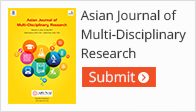Graded Levels of NPK and Organic Sources of Nutrients on Productivity and Profitability of Fodder Maize
S. R. Vinod Kumar, K. Suseendran, P. Stalin, S. Jawahar, K. Arivukkarasu| Journal Title | : | Asian Journal of Multidisciplinary Research |
|---|---|---|
| DOI | : | DOI: http://dx.doi.org/10.20468/ajmdr.2019.5.1.03 |
| Page No | : | 8-11 |
| Volume | : | 5 |
| Issue | : | 1 |
| Month/Year | : | 3/2019 |
Keywords
Economics, Fodder maize, Growth, NPK levels, Organics, Yield
Abstract
Field experiments were conducted at farmer’s field in C. Mutlur Village of Chidambaram Block during Navarai and Samba season of 2010 to study the effect of graded levels of NPK and organic sources of nutrients on productivity and profitability of fodder maize. The experiments were conducted in randomized block design and replicated thrice with seven treatments, namely T1 – 100% Recommended dose fertilizers (RDF), T2 – 75% RDF + Vermiwash at 4% on 15 and 25 DAS, T3 – 50% RDF, T4 – 75% RDF + soil application of humic acid at 0.2% (125 g ha-1), T5 – 50% RDF + Humic acid at 0.2%, T6 – 75% RDF + Panchagavya at 3% on 15 and 25 DAS, and T7 – 50% RDF + Panchagavya at 3% on 15 and 25 DAS. The growth attributes, namely plant height, leaf area index, and dry matter production of fodder maize, were favorably influenced by soil application of 75% RDF + soil application of humic acid at 0.2% (T4 ) and recorded the highest fodder yield of 25.56 and 24.89 t/ha during Navarai 2010 and Samba 2010, respectively. It was followed by 50% of RDF + humic acid (T5 ). The same treatment registered its superiority over others on the economics of fodder maize and recorded higher return per rupee invested of Rs. 1.41 and 1.39 during Navarai and Samba season, respectively. Therefore, it can be concluded that conjoint application of 75% RDF + humic acid at 0.2% holds immense potentiality to boost the productivity and profitability of fodder maize.


